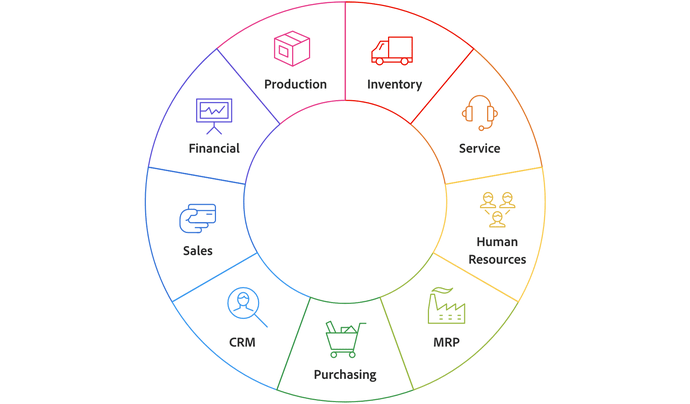ERP (Enterprise Resource Planning) software enables businesses to manage their operations more effectively and automates some departmental activities. With the use of common databases that may be found on-site, in the cloud, or both, ERP systems, which are complete business software, enable users to observe and integrate all activities in a single, comprehensive location.
ERP software was first created largely for inventory management when it first entered the market. The objective of implementing an ERP system nowadays is to improve visibility, gather data on many business areas, and utilize that data to make more strategic decisions and boost enterprise-wide efficiency.
We go into further detail about the various ERP feature categories below:
Integraton
Integration ERP systems may connect to a variety of different business systems to offer a comprehensive software platform for all activities carried out by a company.
When your ERP software is completely integrated, you have a group of programs that are designed to work together. The fact that ERP solutions combine financial, operational, and business data into one location, allowing you to understand how all of your company sectors are interacting, is arguably its most advantageous feature.
Several companies are searching for ERP software only for integration. To add extra features like CRM, eCommerce, and document management, many ERP systems link with 3rd party providers.
Automation
Integrations between different departments and procedures can be streamlined with the use of an ERP. Automation is the term for this. By doing this, the amount of manual input necessary and the time needed to perform tasks will both be reduced.
The capacity to automate various company processes is one of the strong ERP system’s additional key advantages. Manual data input is no longer necessary for regular company activities including payroll, order processing, invoicing, reporting, etc.
The core business may be simplified with the help of an ERP system, and data can be stored centrally for easy access by all users. Also, the inevitable human mistake that comes with manual entry is reduced.
Data Services
The majority of ERP systems are able to gather, monitor, and analyze data on all areas of a business’s activities. Data on daily operations may be exchanged across several companies and departments when every aspect of your firm operates under a single ERP system.
Reports can highlight trends and patterns that reveal areas with successful operations and those with insufficient efficiency. To keep ahead of the competition, businesses gather as much data as is practical, which may then be presented in ways that are both visually appealing and easily understandable.
Supply Chain Management
The ability to manage the supply chain more effectively is one of the most potent advantages offered by enterprise resource planning (ERP) systems. This makes the SCM component of an ERP system one of the most important.
To improve your supply chain, you must use the best SCM features, and gathering real-time data is the first step. Instead of waiting until you receive the data a day or more after the event, real-time data enables you to monitor your supply chain so you can identify and address problems as they arise.
Requisition and approvals management, purchase orders, vendor and supplier administration, sales forecasting, warehouse management, and inventory control are key applications under supply chain management characteristics.
Manufacturing
This component assists companies in increasing the productivity of manufacturing through product planning, materials procurement, daily production monitoring, and product forecasting.
Features of manufacturing ERP reduce machine downtime and boost the effectiveness and quality of the goods produced by your shop’s personnel. Also, there are components available to help with planning distribution, monitoring products, shop-floor control, work order administration, assembly management, and other tasks.
By improving operational effectiveness, cutting order cycles, and making it simpler to generate new income streams, the correct manufacturing features in your ERP will provide your business with a competitive edge.
Human Resources (HR)
Any organization’s top focus should be its employees since without them, there would be no business. By enabling managers to effectively allocate employee time and resources, HR capabilities in ERP software help your organization accomplish its goals.
This results in a more productive and successful firm through improved employee record-keeping and improved employee performance. Payroll software is the most important element you require from an HR component.
Payroll functions, which include the capability for all employee payment duties, such as periodic wage calculation, deduction application, payment processing, and creation of legally needed payroll documents, are included in human resources.
SMB Solutions is flexible and provides a great blend perfectly out of the box to satisfy a company’s evolving demands. Your first preference for an ERP system that is tailored to your company’s demands.


